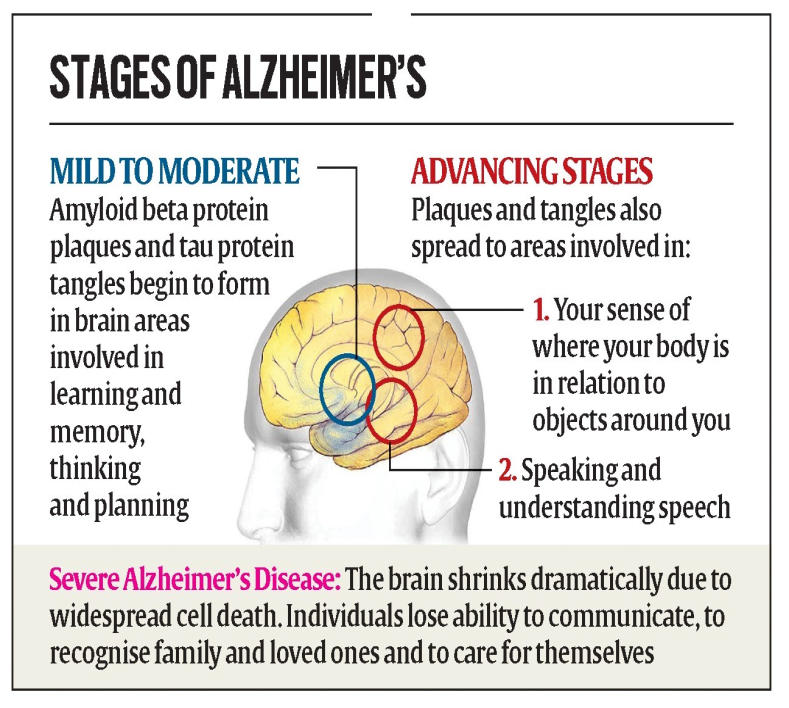Semaglutide May Reduce Alzheimer’s Risk in Diabetics
Why in the news?
A new study suggests that semaglutide, a drug for type 2 diabetes and weight loss, may significantly reduce Alzheimer’s risk. This potential breakthrough offers a novel approach to dementia prevention alongside diabetes management, especially for high-risk populations.
Study Overview and Findings:
- Semaglutide, the active ingredient in popular drugs for type 2 diabetes and weight loss like Ozempic and Wegovy, may reduce the risk of Alzheimer’s disease (AD), according to a study published in Alzheimer’s & Dementia.
- Researchers analysed health records of over a million U.S. patients with type 2 diabetes, comparing semaglutide to seven other diabetes medications, including metformin and insulin.
- The study found that semaglutide users had a significantly lower risk of developing AD, with up to a 70% reduction in first-time Alzheimer’s diagnoses compared to those using insulin.
Mechanism of Brain Protection
- Semaglutide, part of the GLP-1 receptor agonist class, may help protect brain function by reducing neuroinflammation, stabilising blood sugar, and limiting oxidative stress, which can damage brain cells.
- Early research indicates semaglutide lowers toxic protein effects linked to AD, enhances brain cell glucose usage, and reduces harmful plaques and tangles that contribute to Alzheimer’s.
- These protective actions may shield neurons from degeneration, a key factor in Alzheimer’s and other neurodegenerative diseases.
Implications and Future Potential:
- While the U.S. FDA has approved AD treatments targeting amyloid plaques, they come with severe side effects, making semaglutide’s potential as a preventive treatment for Alzheimer’s particularly significant.
- The study suggests a dual-purpose use of GLP-1 drugs in managing diabetes and potentially preventing dementia, a promising option, especially for countries like India, with high rates of type 2 diabetes and related cognitive decline.
About Semaglutide:
- Semaglutide is a GLP-1 receptor agonist (GLP-1 RA) that increases insulin secretion post-meal and reduces glucagon production, helping to manage blood sugar levels.
- Approved by the S. FDA in 2017, it aids in weight loss, lowers hypoglycemia risk, and improves heart and kidney health.
- Studies show semaglutide achieves greater weight loss than other GLP-1 RA drugs, reducing body weight by roughly 4 kg.
- It also slows gastric emptying, leading to prolonged satiety.
Drug Repurposing (DR):
- Drug repurposing (also known as repositioning) identifies new therapeutic uses for existing drugs, providing a cost-effective, low-risk alternative to traditional drug discovery.
- It enhances a drug’s therapeutic value, maximises success, and is efficient in addressing rare and neglected diseases.
- The approach combines experimental and computational methods to develop new uses for already safe drugs, particularly targeting difficult-to-treat conditions.
About Alzheimer’s Disease:
- A progressive brain condition causing memory, thinking, and organisational skill decline.
- It is the most common form of dementia, making up 60-80% of all cases.
- Affects brain areas responsible for thought, memory, and language, impairing daily activities.
- Primarily affects individuals aged 65+, with 10% of cases in younger people.
- Cause: Unclear but likely influenced by genetics, environment, and lifestyle factors.
- Symptoms: Early signs include forgetting recent events; progresses to severe memory issues and daily task impairment.
- Treatment: No cure exists, but some medications and therapies can manage symptoms temporarily.





